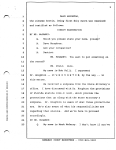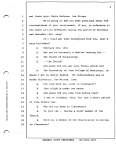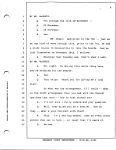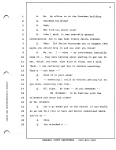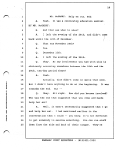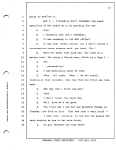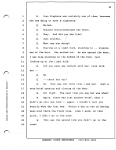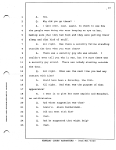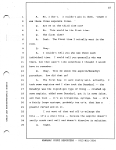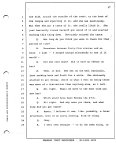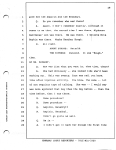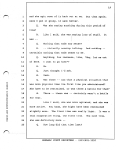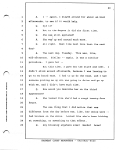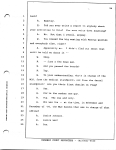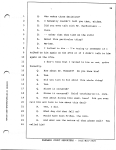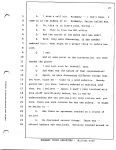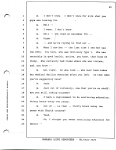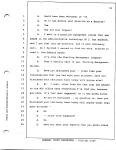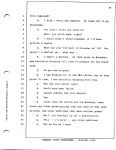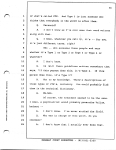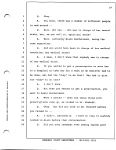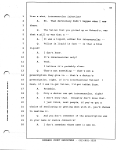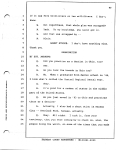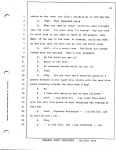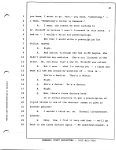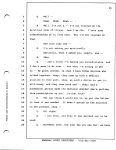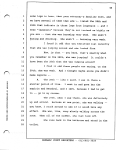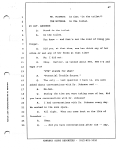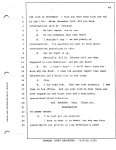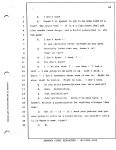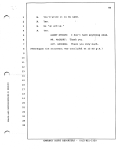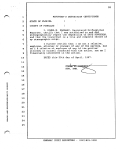Sworn Statement of Dave Houghton, Dentist
| Date: | April 25, 1997 |
| Pages: | 52 |
IN RE: INVESTIGATION, Lisa McPherson ___________________________________________ STATEMENT OF: DAVE HOUGHTON. DATE: April 25, 11:10 a.m. BEFORE: Donna M. Kanabay, RPR, RMR Notary Public, Court Reporter. PLACE: State Attorney's Office Criminal Justice Center Clearwater, Florida APPEARANCES: MR. MARK McGARRY, JR. Assistant State Attorney Attorney for State of Florida. Agent Lee Strope FDLE. Sergeant Wayne Andrews Clearwater PD. MR. ROBERT POLLI 101 E. Kennedy Blvd. Tampa, FL 33602 Attorney for Mr. Houghton KANABAY COURT REPORTERS TAMPA AIRPORT MARRIOTT, (813) 224-9500 ST. PETERSBURG, CLEARWATER, (813) 821-3320 ORIGINAL
page 2
INDEX TO PROCEEDINGS
PAGE LINE
DIRECT EXAMINATION - Mr. McGarry 3 4
EXAMINATION - Agent Strope 32 2
EXAMINATION - Sgt. Andrews 40 9
EXAMINATION - Agent Strope 48 21
Reporter's Certificate 51 1
page 3
DAVE HOUGHTON, the witness herein, being first duly sworn was examined and testified as follows:
DIRECT EXAMINATION BY MR. McGARRY:
Q. Would you please state your name, p1ease?
A. Dave Houghton.
Q. And your occupation?
A. Dentist.
MR. McGARRY: You want to put something on the record?
MR. POLLI: Sure. My name is Bob Polli. I represent Dr. Houghton -- it's H 0 U G H T 0 N, by the way -- in this matter. We received a subpoena from the State Attorney's office. I have discussed with Dr. Houghton the provisions of Florida statute 1914.0 (sic), which provide the protections that go along with the State Attorney's subpoena. Dr. Houghton is aware of what those protections are. He's also aware of what his responsibilities are regarding that statute. And we're here to proceed accordingly.
BY MR. McGARRY:
Q. My name is Mark McGarry. I don't know if you've
page 4
met these guys; Wayne Andrews, Lee Strope. We're going to ask you some questions about the. circumstances of your involvement, if any, in reference to the death of Lisa McPherson during the period of November and December 1995, okay? If I could get some background from you, what's your birthdate?
A. X 1961.
Q. And you're currently a dentist working for --
A. The Church of Scientology.
Q. - - the Church? And where did you get your formal education?
A. The University of Iowa College of Dentistry, is where I got my dental degree. My undergraduate was at Drake University, Des Moines, Iowa.
Q. How long have you lived in Clearwater?
A. Just slightly under two years.
Q. And where did you come from before that?
A. I was in Columbus, Ohio, for just a short period of time before that..
Q. Why did you move to Clearwater?
A. To join the - - become a staff member of the Church.
Q. Were you a member of the Church prior to moving to Clearwater?
page 5
A. I was a parishioner, yes.
Q. Up in--.
A. Columbus.
Q. -- Ohio?
A. Yeah.
Q. So they suggested, if you want to be a staff member, Flag, Clearwater's where you've got to go?
A. That was my origination. That's where I wanted to go.
Q. Okay. Have you ever been here before?
A. Yes.
Q. So you knew it was a nice place.
A. Yes.
Q. So do you remember the month you started - - You started in 95, I assume, sometime.
A. Yeah. I -- actually, I started in July of 95. I couldn't be a dentist, couldn't be a practicing dentist until January of 96, because I had to wait to take the Florida board exam.
Q. I got you.
MR. POLLI: Tell him when the board exam was.
A. The examination was the 7th through the 11th of December of 95.
page 6
BY MR. McGARRY:
Q. 7th through the 11th of November --
A. Of December.
Q. Of December.
A. Yes.
MR. POLLI And prior to the 7th - - just so we can kind of move through this, prior to the 7th, he had a study course in Gainesville to take the boards. And he left Clearwater on November 28th, I believe.
A. Whatever that Tuesday was, that's when I left.
BY MR. McGARRY:
Q. All right. So during this whole thing here, you're studying for the boards.
A. Yes.
Q. That helps. Thank you for giving me a jump start. So what was the arrangement, if I could -- what is the staff arrangement that you had with the Church? How does that work - - how is that worked out?
A. I'm not sure I fully understand your question.
Q. Well, they hired you as a dentist. How do they -- what's your contract with them?
A. Okay. I'm a Sea Org member, same as every other person that sat in here -- at least that I'm aware of.
Q. Mm-hmm.
page 7
A. I sign -- you know, sign the contract. Payment is room and board and fifty dollars a week. Basic Sea Org member.
Q. Room and board, fifty a week. That's pretty slim pickings for somebody that just finished dental school.
A. I've been out of school ten years. Graduated 86. But I obviously don't do it for material gain.
Q. Mm-hmm. So even now, that's what your deal is?
A. Yes. My wife gets the same thing.
Q. Okay. You're living in the Hacienda area or --
A. Actually, no. I live -- I have two kids. We live at the QI. Used to be a Quality Inn.
Q. Right. They bought that recently, right?
A. I-
Q. Relatively new acquisition or - -
A. No. The new acquisitions are the ones down on North Ft. Harrison: The Tradewinds, the Clipper and the Bayside..
Q. There's a rumor floating around that the Biltmore might be going to the Church. Is that true? Have you heard that? You didn't hear that?
page 8
A. No.
MR. MCGARRY: You guys hear that?
A. The what?
BY MR. McGARRY:
Q. Biltmore.
A. Where is that?
Q. That's a big Clearwater country club.
A. Okay. That's news to me. But as the dentist, they don't necessarily keep me apprised of real estate acquisitions.
Q. Okay. Going right into the Lisa McPherson thing, how did you become involved with that?
A. Well, I -- because I was going to be in the dentist's office, which is part of the MLO office --
Q. Mm-hmm.
A. I'm assuming you guys understand some of these things - -
Q. Yeah, we kind of got a little bit of a grip on it.
A. Just general conversation, I got that, you know, there was someone who was obviously having difficulty, who was at the Ft. Harrison.
Q. Is that where your office is?
A. No.
Q. Your dental office?
page 9
A. No. My office is in the Coachman Building.
Q. Coachman building?.
A. Yeah.
Q. Who told you about Lisa?
A. Like I said, it was basically general conversation, but it was most likely Janice Johnson.
Q. Okay. Did Janice encourage you or suggest that maybe you should drop in and see what you think?
A. No, no. I -- what -- my involvement basically came on - - they were talking about wanting to get her to eat, drink, you know, that kind of thing, and I said, Well, I can certainly get her to swallow something. That' s - - you know - -"
Q. Kind of in your area?
A. - - something I could do without getting bit or, you know, something like that.
Q. All right. So that -- do you remember --
MR. McGARRY: Is he familiar with the calendars and dates and times?
BY MR. McGARRY:.
Q. Let's go ahead put on the record, if you would, so we can fill this in here and better understand where you're at --
A. Okay.
Q. You attended a - -
page 10
MR. McGARRY: Help me out, Bob.
A. Yeah. It was a continuing education seminar.
BY MR. McGARRY:
Q. And that was when to when?
A. I left the evening of the 28th, and didn't come back until the 12th of December.
Q. That was November 28th?
A. Yes.
Q. December 12th.
A. I left the evening of the 28th.
Q. Okay. So any involvement you had with Lisa is obviously occurring somewhere between the 18th and the 28th, ten-day period there?
A. Yeah. Actually, mine didn't come in quite that soon. But I didn't have anything to do at the beginning. It was towards the end. But --
Q. Okay. All right. How did you become involved? Who was the one that suggested that you come and maybe help her eat?
A. Well, it wasn't necessarily suggested that I go and help her eat. I had mentioned earlier in the conversation that I could -- you know, it's not difficult to get somebody to swallow something. You can run stuff down from the side and back of their tongue. They're
page 11
going to swallow it. And I -- I honestly don't remember the exact specifics of who asked me to do anything for her.
Q. Okay.
A. I honestly just don't remember.,
Q. It was somebody in the MLO of office?
A. It was most likely Janice, but I don't recall a conversation where someone said, you know, "Go."
Q. Were you aware that Lisa was, for lack of a better term, for using a Church term, which is a Type 3 - -
A. Yes.
Q. - - personality?
A. I was definitely aware of that.
Q. Okay. All right. When -- do you recall, looking at that calendar, what day that you first saw Lisa was?
A. The day that I first saw her?
Q. Yeah.
A. I don't recall the exact day.
Q. Well, give me a ballpark.
A. The first.. day I saw her was probably Monday or Tuesday, the 20th or 21st. That was just a very brief -- I went over, actually, to see how the people who were keeping an eye on her were doing.
Q. Do you remember who they were?
page 12
A. Joan Stephens was certainly one of them, because she was dying to have a cigarette.
Q. Mm-hmm.
A. Suzanne Schnurrenburger was there.
Q. Okay. And did you see Lisa? A Just briefly
Q. What was she doing?
A. Staring at a light bulb, standing in -- Suzanne was at the door. She walked out. As she opened the door, I saw Lisa standing in the middle of the room, just looking up at the light bulb.
Q. Did you have any contact with her, talk with her --
A. No.
Q. - - check her out?
A. No. That was the first time I saw her. Just a very brief opening and closing of the door.
Q. All right. The next time you saw her was when?
A. Again, there was just another brief, when I didn't go into the room -- again, I couldn't tell you exactly what day that was. Within a day or two of having been over there the first time. Like I said, at that point, I didn't go in the room.
Q. That was the second time you didn't go in the room?
page 13
A. Yes.
Q. Why did you go there?
A. I went over, just, again, to check to see how the people were doing who were keeping an eye on her, making sure 1that they had food and they were getting their sleep and that kind of stuff.
Q. All right. Was there a security fellow standing outside the door when you were there?
A. There was a security guy who was around. I couldn't even tell you who it was, but I'm sure there was a security guy around. There was nobody standing outside the door.
Q. All right. When was the next time you had any contact with Lisa?
A. Would have been a Saturday, the 25th.
Q. All right. And what was the purpose of that appearance?
A. I went in to give her some aspirin and Benadryl, an antihistamine.
Q. And whose suggestion was that?
A. Alain's. Alain Kartuzinski.
Q. Did you meet with him?
A. Yeah.
Q. And he suggested that might help?
A. Yeah.
page 14
Q. What was the purpose of that meeting?
A. Apparently, she -Lisa hadn't been sleeping well, and they wanted to do something to help her sleep.. And you know, basically, it was a discussion of what might be given to her to help her do that.
Q. And that was his suggestion? Did you concur with that?
A. I didn't -- certainly seemed fine to me, some aspirin and Benadryl. Certainly makes people drowsy.
Q. All right. So that was your plan? How was she acting when you saw her on Saturday the 25th?
A. She -- I mean, she was obviously --
Q. Type 3.
A. -- Type 3. Talking -- basically talking incessantly; very -- things that didn't -- you know, didn't follow one or the other; didn't make any sense, particularly. She-
Q. Do you remember what time that was, you were there on Saturday?
A. It would have been late afternoon. I don't know the exact time. Late afternoon, beginning of the early evening.
Q. Do you remember who the girls were that were staying there, watching?
page 15
A. No, I don't. I couldn't pin it down, cause I was there three separate times.
Q. Are we on the third time now?
A. No. This would be the first time.
Q. The first time?
A. Yeah. The first time I actually went in the room.
Q. Okay.
A. I couldn't tell you who was there each individual time. I could tell you generally who was there, but that wasn't like something I thought I would have to remember.
Q. Okay. Tell me about the aspirin/Benadryl procedure. How did that go?
A. The first day, it went really well, actually. took some aspirins and I also took the Benadryl - - the Benadryl was the liquid-gel type of thing - - crushed up some aspirin, added some Benadryl, put it in some juice, and then took -- it's an irrigating, syringe, has -- It's a fairly large syringe, probably ten cc's, that has a plastic curved end on it. I cut most of that end off to enlarge the hole -- it's a small hole -- because the aspirin doesn't really crush real well and doesn't dissolve in solution.
Q. Right.
page 16
A. And you know, I just ended up giving it to her.
Q. I take it you did that procedure because she was not voluntarily taking anything orally, food or liquid?
A. Yeah. It was my understanding she wasn't eating or drinking, well; that there could be some, but not sufficient quantities to - -
Q. Did she have to be restrained to do this procedure?
A. Well, the way it worked is, I knelt down on the bed and sat her down. But you know, it wasn't like forcing down. Basically, just guided her down. There were people around who were holding her, just in case she did do something, but it wasn't like forcibly holding down. There wasn't a lot of struggling or anything like that. It was -- at least not that I was aware of. You know, I was worried about -- I'm putting my fingers in this girl's mouth --
Q. Might lose one.
A. I was worried about teeth. That's what I was paying attention to.
Q. Come out of there one digit short. Did you accomplish the mission, so to speak?
A. Yeah, yeah. The first time went really well. gave her some. And like I said, I was kind of running it down
page 17
the side, around the outside of the teeth, to the back of the tongue and squirting it in, and she was swallowing. But when she got a taste of it, she really liked it. She just basically turned herself got ahold of it and started sucking this thing down. Obviously enjoyed the taste.
Q. How long do you think you were in there for that period of time?
A. Somewhere between forty-five minutes and an hour. I just - - I stayed around afterwards to see if it would --
Q. Did she calm down? Did it have an effect on her?
A. Yeah, it did. She sat on the bed, basically, just rocking back and forth for a while. She obviously started to get drowsy, which is what I felt my being there was more of a distraction than anything else, so I left.
Q. All right. Shall we move to the next time you saw her?
A. Which would have been Monday the 27th.
Q. All right. And why were you there, and what time did you get there?
A. Again, I believe it was, like, probably, a later afternoon, more of an early evening, kind of thing.
Q. Okay.
A. I went over because -- to do the same thing, to
page 18
give her the aspirin and the Benadryl.
Q. Do you remember who was there?
A. Again, I don't remember exactly, although it seems to me that, the second time I was there, Alphonso Barcenas' son was there. He was there. I believe Rita Boykin was there. Maybe Heather Hough.
Q. All right. AGENT STROPE: Petzold. THE WITNESS: Petzold. It was "Hough," then.
BY MR. McGARRY:
Q. How was Lisa when you went in, that time, there? A.. She had obviously -- she looked like she'd been working out. Hair was sweaty, face was red, you know, like after vigorous activity. You know, the same - - lot of non sequitur type of talking. She was -- I would say was more agitated that day than the day before - - than the time before, that I was there.
Q. Same procedure?
A. Same procedure - -
Q. Aspirin, Benadryl?
A. Aspirin, Benadryl. Didn't go quite as well.
Q. As in-
A. I didn't get it back far enough the first time
page 19
and she spit some of it back out at me. But then again, once I got it going, it went better.
Q. Was she saying anything during this period of time?
A. Like I said, she was saying lots of stuff. It was--
Q. Nothing that made any sense?
A. - - virtually nonstop talking. And nothing -- certainly nothing that made sense to me.
Q. Anything, for instance, like, "Hey, let me out of here. I want to go home"?
A. No.
Q. Just thought I'd ask.
A. Yeah.
Q. Was there -- was that a physical situation that was more physical than the first time you administered? She have to be restrained, or was there a battle for that?
A. There -- there was -- certainly wasn't a battle for that. Like I said, she was more agitated, and she was more active. You know, she might have been restrained slightly more. The first time was really light. It was a real cooperative thing, the first time. The next time, she was definitely more --
Q. How long did that time last?
page 20
A. I - - again, I stayed around for about an hour afterwards, to see if it would help.
Q. Did it?
A. Not to the degree it did the first time.
Q. She was still agitated? A She was up and around much more
Q. All right.. Next time must have been the next day?
A. The next day, Tuesday. This was, like, mid-afternoon. Similar -- again, it was a similar procedure. I gave her -- But this time, I gave her the stuff and left. didn't stick around afterwards, because I was leaving to go to my board exam. I had to go do the exam, and I had someone picking me up who was going to drive and go up with me, and I didn't have much time.
Q. How would you describe her on the third appearance?
A. She looked like she'd had a rough twenty-four hours. The one thing that I did notice that was different from the day before was, like, her shins were - - had bruises on the shins. Looked like she's been kicking at something, or something to that effect.
Q. Any bruising anywhere else? Hands? Arms?
page 21
A. Nothing that I noted at that point. I did notice the legs.
Q. Was she up and around any of these times -- any of these past three times, or was she on the bed each time you.. saw her?
A. She was definitely -- she was up and around The first day, when I got there, she was, you know, like, up and around, but walking, and that kind of thing. The second day, like I said, I didn't stick around. The third day - - the second day, she was definitely more active afterwards.
Q. Did you ever see Janice Johnson in the room with you at the same time?
A. I don't recall Janice being there at the same time I was there.
Q. Did you have any discussions with her about this procedure?
A. Sure.
Q. You did?
A. I mean, I'm not sure I'm going to recall specifics, but I'm sure we talked about it.
Q. Maybe in the MLO office?
A. Yeah. Exactly.
Q. What did she tell you? What was your understanding of the whole mission here for this girl?
page 22
A. Well, she was one of our parishioners who was Type 3, and we were trying to help her through this obviously rough time for her, you know, to help her get back to normal and doing well.
Q. Mm-hmm. So that was the purpose of this mission, this watch?
A. Absolutely.
Q. Janice ever relay to you how she thought it was going?
A. You know, only in general-terms kinds of things, you know. And it was -- our concern was for Lisa, obviously. Also, for the people who were there watching, you know, because those are our staff members and, you know, we were concerned about them as well. We knew there wasn't a lot of sleep on some nights. I know, other nights, sometimes, were better than others. But you know, we were concerned about them as well.
Q. Any other contact with Lisa after the 28th?
A. No.
Q. When did you find out that she'd expired?
A. Not till I returned - -
Q. December 12th?
A. Yeah.
page 23
Q. Who told you that?
A. It was either Janice or Suzanne. Janice Johnson or Suzanne Schnurrenburger.
Q. What did they tell you?
A. I don't -- again, I don't have big recall on that. Because the circumstances where I was returning from this test, there was a lot of people who wanted to make sure I passed this thing so I could start practicing here in the state, and my focus was much more on that than on this other -- than on Lisa's situation. And I was told that, you know -- cause when I first came in, they asked me about my exam; how it had gone; did I think I passed; all that kind of stuff. I asked them how things had been with them. They said it had been an interesting time, and that, you know, Lisa had passed away. At one point, they thought it might be meningitis, and they'd actually taken everybody who had contact with her and, you know -- or even, like, my family who'd had contact with me, who'd had contact with her -- they took them and put them all in a place where they could keep an eye on them.
Q. You found out that was what they did --
A. I found out that's what they did after she died.
Q. Because this was a full week later, you got
page 24
back?
A. Exactly.
Q. Did you ever write a report to anybody about your activities to this? You ever write down anything?
A. No. Not that I recall, anyway.
Q. You missed the big meeting with Marcus Quirino and everybody else, right?
A. Apparently so. I didn't find out about that until he told me about it - -
Q. Okay.
A. -- Just a few days ago.
Q. And you passed the boards?
A. Yup.
Q. To your understanding, who's in charge of the MLO, from the medical standpoint; not from the dental standpoint? Are you their first dentist at Flag?
A. Yes.
Q. You're the number one guy.
A. Yup. The one and only.
Q. Who was the -- at the time, in November and December of 95, the MLO honcho that was in charge of that office?
A. Janice Johnson.
Q. Janice was?
A. Yes.
page 25
Q. So she's the one that would have been in charge of the general welfare of Lisa McPherson?
A. I wouldn't -- I wouldn't necessarily say that, because Janice is -- the Medical Liaison Office is broken up into several different functions. And Janice was the Medical Liaison Officer for the staff, which means we've got -- we've got a base of about a thousand people. And when the people needed to get to a doctor, she made sure that happened. And --
Q. So Emma was in charge of the regular parishioners?
A. Emma's the Public MLO, yes.
Q. And still is.
A. And still is.
Q. And Judy Colesberry Webber was running around in that office about that time, wasn't she?
A. Yes. She was the Deputy Staff MLO.
Q. She's not any more, though.
A. No, she's not.
Q. Since this occurred - - you ever been involved like this before?
A. No.
Q. Would you say that you doubt it would be run this way again?
A. I don't know, quite honestly.
page 26
Q. Who makes those decisions?
A. I honestly couldn't tell you that, either.
Q. Did you ever talk with Mr. Kartuzinski --
A. Sure.
Q. - - other than that time on the 25th?
A. About this particular thing?
Q. Mm-hmm.
A. I talked to him -- I'm trying to remember if I talked to him again on the 27th or if I didn't talk to him again on the 27th. I don't know that I talked to him or not, quite honestly.
Q. How about Dr. Minkoff? Do you know him?
A. Yes.
Q. Did you talk to him about this whole thing?
A. Yes.
Q. Since it occurred?
A. Since it occurred? Brief touching-on-it, once.
Q. How about during this week, here? Did you ever call him and talk to him about this deal?
A. Yes, I did.
Q. What day did that fall on?
A. Would have been Friday, the 24th.
Q. And what was the nature of that phone call? You called him?
page 27
A. I didn't call him. Probably -- I don't know. came in in the middle of it. Probably, Janice called him.
Q. Oh, this is in Lisa's room, during --
A. No. This is from the MLO office.
Q. And the nature of the phone call was what?
A. Well, they were discussing, if she needed sedated (sic), what might be a proper thing to sedate her with.
Q. I see. And at some point in the conversation, you were handed the phone?
A. I did talk with Dr. Minkoff, yeah.
Q. And what was the nature of that conversation?
A. Again, we were discussing different things that, you know, might be -- might be a good sedative. Nobody wanted her, you know, heavily sedated or anything like that, but I believe -- again, I wasn't real involved with this stuff terrifically before, but it was my understanding she was getting a bit more violent and, you know, there was some concern for her own safety. It might be better to --
Q. Was there an agreement reached on a course of action?
A. We discussed several things. There was -- chloral hydrate was mentioned. Actually checked around to
page 28
different pharmacies to see if we could find some, particularly looking for something in liquid form, because that was the only way we could hope to get her to take it. Didn't find any. So we tried - - you know, actually called back Dr. Minkoff and discussed it a bit more, and decided that Valium would probably be the best thing.
Q. All right. And did he call that in?
A. Yes, he did.
Q. And was that - - do you remember what pharmacy you used? Eckerd's, maybe?
A. Eckerd's at Gulf-to-Bay.
Q. And do you remember what name it was under?
A. No, I don't.
Q. Do you recall who picked it up?
A. I picked it up.
Q. You did?
A. Yes. It could have been under my name --
Q. All right.
A. -- it could have been under Janice's. I don't remember.
Q. All right.
A. Could have been under Lisa's. I don't remember.
Q. Okay. And did you, in fact, pick it up?
page 29
A. Yes.
Q. And that was on the 24tth?
A. Yes. Late that evening.
Q. All right. And when, if ever, was that Valium used on Lisa? A To my knowledge, it was never used
Q. All right. And why is that?
A. Again, to my knowledge, Mr. Kartuzinski didn't want her to have anything that heavy.
Q. And he was running the spiritual end of this.
A. Right.
Q. So I suspect that you talked to Mr. Kartuzinski on the night of the 25th and indicated to him that you'd been, on the 24th, to pick up the Valium?
A. Yes.
Q. And that is the opportunity he took to tell you--
A. He certainly knew we had the Valium, right. And he didn't want to give her anything that heavy.
Q. So he nixed that.
A. Yes.
Q. Okay. Now, other than the stuff we've already covered, is there something -- any other contact or area that you think might be pertinent towards this investigation?
page 30
A. I don't know. I don't know for sure what you guys are looking for.
Q. Well --
A. I mean, I don't know.
Q. Well she died on December 5th - - A Right
Q. -- and we're trying to find out --
A. When I saw her -- the last time I saw her was the 28th. You know, she was obviously Type 3. She was certainly in good health, active, you know, that kind of thing. She certainly had times where she was violent, and, you know - -
Q. All right. So she took -- she must have taken her medical decline sometime after you left. Is that what you're suggesting here?
A. Yeah.
Q. Just out of curiosity, now that you're on staff, are you still taking courses?
A. I have a requirement to do continuing education, thirty hours every two years.
Q. Out of - - is that - - thirty hours every two years with Church courses?
A. Yeah. Oh, I thought you meant continuing education for dental - -
page 31
Q. No.
A. I mean, certainly, I do courses - -
Q. That's why you're there.
A. -- on a regular basis. I'm there to help my church. That's why I'm there
Q. What level have you achieved, as far as your course materials are concerned? Is there a level?
A. Well --
Q. I talked to Dr. Minkoff. He said he was an 0T8.
A. I'm 0T4. That just needs a little clarification. There's two sides to that. Training, and there's -- the courses, and then there's the auditing.
Q. Right.
A. I'm OT4 in the auditing portion.
Q. And your wife's doing this, too, right?
A. Yes.
Q. Children?
A. Two.
MR. McGARRY: All right. I'm done with my questions. If you want to take a break, we can, but I think we probably can wrap this up pretty quickly, if you want to.
MR. POLLI: I've got a hearing at
page 32
one-thirty, so plunge on. EXAMINATION BY AGENT STROPE:
Q. I've just got a couple of questions. What's your date of birth?
A. February 2nd 61.
Q. I'm sorry. I didn't get it the first time. Social Security number?
A. X
Q. You said you graduated from dental school when?
A. 1986.
Q. And you took the boards in 96?
A. Well, I took -- I took the Florida boards --
Q. So you practiced as a dentist somewhere else?
A. Yeah.
Q. Where at?
A. I practiced in Iowa from 86 till 93, and I actually sold my practice, at that point, with the intention of going into Sea Org.
Q. When -- when did you first become affiliated with the organization?
A. With Scientology --
Q. Mm-hmm.
A. -- or with Flag?
Q. With Scientology.
page 33
A. Would have been November of 89.
Q. So it was during your practice as a dentist?
A. Yes.
Q. How did that happen?
A. I went to a practice management course that was based on the administrative technology of L. Ron Hubbard, and I put that into my practice, and it went extremely well. So I decided I wanted to find out more, started to read L. Ron Hubbard books.
Q. It's like the Sterling Management Company?
A. That's exactly what it was, Sterling Management, mm-hmm.
Q. Have you discussed your - - other than your conversations that you had with your attorney, have you discussed your testimony here today with anyone else?
A. No. I mean, other than the fact that the people in the MLO office know everything I've told you, because, you know, it's just what happened, as it was going along.
Q. So you've discussed -- my question is, have you discussed your testimony here today with anyone other than your attorney - -
A. No.
Q. -- since this happened?
A. No.
Q. Have you seen your reports that you wrote since
page 34
this happened?
A. I didn't write any reports. At least not to my knowledge.
Q. You didn't write any reports? Well, you would know, right?
A. I would think I would remember if I'd have written a report.
Q. What was your job back in November of 95? You weren't a dentist yet. What was --
A. I wasn't a dentist. At that point in November, was basically studying full time to prepare for the board exam.
Q. So you had no post?
A. I was helping out in the MLO office, but at that point in time, I was basically studying full time.
Q. Who was your senior then?
A. Would have been Janice.
Q. Janice Johnson was your senior?
A. Yes.
Q. Other than the Valium and the Benadryl, were there any other prescriptions that you know of that were written, any other medicines that were written given?
A. Well, the Benadryl is not a prescription.
Q. Well -- I'm sorry -- any other medicine?
A. Not as far as I know.
page 35
Q. And as far as you know, the Valium was not used?
A. As far as I know, it was not used.
Q. Do you remember what was told to Dr. Minkoff that would necessitate him to write the prescription for Valium?
A. Pardon me?
Q. Do you remember what was told to Minkoff regarding Lisa's condition which would result in his writing his prescription for Valium?
A. He certainly knew she was Type 3. I don't remember the specifics of the conversation, other than we talked about different types of sedatives. You know, his idea was that the Valium was actually a fairly mild type of sedative, as far as those things go; that if -- you know, if we get into anything else, it was going to get something real heavy.
Q. Type 3 -- is that a -- kind of a degree of psychiatric evaluation, would you say?
A. No.
Q. Is that a degree of mental instability, as defined by the organization, much like a psychiatrist would do?
A. No. It's -- it more has to do what's going on with the person, spiritually, quite honestly. There's three -- there's three basic types. It's actually a type
page 36
of what's called PTS. And Type 3 is just someone who thinks that everybody in the world is after them.
Q. Paranoid?
A. I don't know as I've ever seen that word written along with that.
Q. I mean, whatever you call it, it's -- for you, it's just different terms, right? Who - - who assesses these people and says whether it's Type 1 or Type 2 or Type 3 or Type 4 or whatever?
A. I don't know.
Q. Is (sic) there guidelines written somewhere that says, "If this person does this, it's Type 2. If this person does this, it's Type 3"?
A. Not to my knowledge. There's descriptions of those types of PTS's, certainly. You could probably find them in the technical dictionary.
Q. Mm-hmm. Of course, the treatment seemed to be the same. I mean, a psychiatrist would probably prescribe Valium, bedrest - -
A. I don't know. I've never studied the field.
Q. Who was in charge of this watch, do you remember?
A. I don't know that I actually ever knew that.
page 37
Q. Okay.
A. You know, there was a number of different people in and around - -
Q. Well, who was -- who was in charge of her mental state, her, as you call/ it, spiritual state? A Well, certainly Alain Kartuzinski, being the case supervisor.
Q. And who would have been in charge of her medical condition, her medical state?
A. I mean, I don't know that anybody was in charge of her medical state.
Q. If you wanted to get a prescription or move her to a hospital or take her for a walk or do whatever had to be done, who had the "okay" to do that? Who had to give the "okay" to do that?
A. I don't know.
Q. But when you wanted to get a prescription, you went to Alain Kartuzinski.
A. When I wanted - - when the whole thing with prescriptions came up, we talked to Dr. Minkoff.
Q. Okay. But did you talk to Dr. Minkoff before you talked to --
A. I didn't, personally. I have no idea if anybody talked to Alain before that conversation.
Q. Did you ever remember ever seeing anyone give
page 38
Lisa a shot, intermuscular injection?
A. No. That definitely didn't happen when I was there.
Q. The Valium that you picked up at Eckerd's, was that a pill or was that a -- A It was a liquid, either for intermuscular - -
Q. Valium in liquid is just -- is that a blue liquid?
A. I don't know.
Q. It's intermuscular only?
A. Yeah. I believe it's probably clear.
Q. That's not something -- that's not a prescription they give to -- that's a doctor's prescription, right, if it's intermuscular Valium? I mean, if I was to get Valium, I'd get tablet form.
A. Probably.
Q. Only a doctor can get intermuscular, right?
A. I don't know that. Honestly don't know that. I just think, most people, if you've got a choice of swallowing or getting shot with it, you'd choose to swallow it.
Q. And you don't remember if the prescription was in your name or Janice Johnson's?
A. I don't remember whose name it was in.
page 39
Q. But it was Eckerd's on Gulf-to-Bay?
A. It was definitely Eckerd's on Gulf-to-Bay.
Q. And who paid for that prescription?
A. I picked it up.
Q. Yeah. Who paid for it? You paid for it?
A. No. Alain Karduzinski was -- that's where I got the money to pick it up.
Q. So Alain gave you the money to buy the prescription?
A. Yes.
Q. Was it bought through normal channels? Do you have a prescription insurance plan or --
A. No. I mean -- no, we don't.
Q. So you paid the full price?
A. Yes.
Q. Cash?
A. Yeah. It was somewhere -- twenty-five, thirty bucks, something in that range.
Q. Do you remember how many doses you --
A. I believe -- I mean, it was -- it was a small box.
Q. Okay.
A. I'm sure it was a vial of Valium. I don't know
page 40
if it was five milliliters or ten milliliters. I don't know.
Q. But regardless, that whole plan was scrapped?
A. Yeah. To my knowledge, she never got it.
Q. Arid that was scrapped by - -
A. Alain. AGENT STROPE: I don't have anything else. Thank you. EXAMINATION BY SGT. ANDREWS:
Q. Did you practice as a dentist in Ohio, too?
A. Yes.
Q. So you took the boards in Ohio too?
A. No. When I graduated from dental school in 86, I took what's called the Central Regional Dental Test.
Q. Okay.
A. It's good for a number of states in the middle part of the United States.
Q. So you just moved in 93 to Ohio and practiced there as a dentist?.
A. Actually, I also had a short stint in Kansas City -- Overland Park, Kansas, actually.
Q. Okay. All right. I took it, from your testimony, that you were coming by to check on, also, the people doing the watch, so some of the times that you made
page 41
visits to her room, you didn't actually go in and see her.
A. Yeah. That happened twice.
Q. When you came by there, could you walk straight into the room? You know, what I'm saying? Say you come to visit Lisa or you came to check on the people, like Emma, if she was in the room, or Suzanne, could you walk up and just open the door and go into the hotel room?
A. Well, it's a hotel room. The doors are always locked from the outside. That's just standard.
Q. So how would you get in?
A. Knock on the door.
Q. So somebody inside would let you in?
A. Yeah.
Q. Okay. Did you ever see a security guard or a person dressed in the light blue shirts with the dark blue pants standing outside the door with a key?
A. No.
Q. I know your security has so many uniforms --
A. Yeah. I saw Security -- the light blue shirt with the dark blue pants is what everybody was wearing at the time.
Q. Yeah. Alphonso Barcenas -- I talked him, and he said he had a key - -
A. Okay.
Q. - - to the door, and I was wondering -- you
page 42
mentioned his name again - -
A. Right. I saw him. He was inside one of the times that I was there.
Q. Okay.
A. That's the second time I was there.
Q. To your knowledge, could Lisa leave the room?
A. I honestly don't know.
Q. Okay. So if you're in there giving her this medicine and this syringe, and she said to you, "Listen, I don't want this stuff. I'm going to walk out of the room," could she do that?
A. I would certainly think so. Had she been able to look at us and say something like that, I think we all would have been very happy.
Q. This whole thing with the prescription -- you're a dentist, been a dentist since 86?
A. Mm-hmm. Right.
Q. Is this normal? I mean --
A. What do you mean?
Q. Well, you know, you have a -- Dr. Johnson, okay,. and an MD on the telephone, with a doctor here in Florida, and a dentist on the telephone, and you guys are getting Valium in liquid form in somebody else's name for a patient you're taking care of in some room at a hotel. I mean, to me, as a cop for twenty-five years,
page 43
you know, I start to go, "Boy," you know, "something," - - I mean, "Something's rotten in Denmark."
A. I mean, the reason we were talking to Dr. Minkoff is because I wasn't licensed in this state. had no -- I wouldn't write any prescriptions. Not that I would write a prescription for Valium, anyway.
Q. Right.
A. And Janice, although she has an MD degree, she didn't practice any medicine. She's not licensed in the state. So, you know, that's why Dr. Minkoff was called.
Q. But I mean -- what I'm asking you -- I think you went all the way around my question of - - this is -- You're a dentist. That's a doctor.
A. Right.
Q. She's a doctor. He's a doctor.
A. Right.
Q. Now, there's three doctors here. Is it normal practice to get a prescription of liquid Valium in one of the doctors' names to give. to another patient?
A. I wouldn't think so, no. Unusual circumstance, however.
Q. Okay. Now, I find it very odd that -- we'll go back to the three doctors again -- MD anesthesiologist, a
page 44
dentist and another MD in Florida, working in an emergency room, and an infectious disease specialist, okay, and the three of these people, who are all medical people, put their heads together and they get liquid Valium, and they send a doctor to get the liquid Valium, and he pays for it out of his pocket, he brings it back to the hotel, and we've got a civilian, nonmedical person, who says, "Huh-uh. You ain't giving it to her."
A. It is what happened. I agree that does sound kind of strange.
Q. Right. And I think Special Agent Strope asked you who was in charge, and you kind of drifted around the fact that, maybe, Karduzinski. Wouldn't that give you the impression that this is the guy pulling the strings? If he can tell three doctors who's already gone to all this trouble of getting the liquid Valium and carting it back and sending a doctor to get it with thirty dollars in his pocket, and they come back, and he pulls the plug on this thing, would that give you the impression he's in charge?
A. Sure.
Q. Thank you.
A. I mean, he was definitely in charge of the spiritual side of it.
page 45
Q. Well -- Woah. Woah. Woah --
A. Well, I'm not a -- I'm not trained on the spiritual side of things. And I am OT4. I have some understanding 9f it from that. But I'm not trained on that. And this lady was - -
Q. I'm not asking you spiritually. Basically, what I asked you, simply, was - -
A. Okay.
Q. -- and I think I'm making you uncomfortable, and I don't mean to do that -- but what I'm trying to get is -- my point across, is that I have three doctors who talked together, okay; they come up with a medical solution to this girl, okay; we send a doctor to get it, with money; and they came back and -- okay; and a nonmedical person made the decision whether she's getting this prescription or not. Is that true?
A. The one thing I would say is, we got the Valium in case it was needed. It wasn't gotten as the solution to her problem, okay - -
Q. All right.
A. - - you know, and then it was decided not to be used.
Q. November 28th, the last day you saw her, we have
page 46
some logs in here, that your attorney's familiar with, and we have several of them that are ~-- listed the 28th and 29th that indicate in those logs from laypeople - - and I mean "laypeople" because they're not trained as highly as you are -- that she was becoming very weak. She wasn't eating and drinking She wasn't -- becoming very weak I found it odd that you testified just recently that she was jumping around and she looked fine. Now, is that -- you know, that's exactly what you remember on the 28th; she was jumping? It couldn't have been the 25th that she was jumping around? I find it odd these people are saying, on the 28th, she was weak. And I thought maybe since you didn't make reports - -
A. The 28th -- like I said, I was in there a shorter period of time. I went in and gave her the aspirin and Benadryl, and I left, because I had to get to -- go to my course. The 27th, when I was there, she was definitely up and around. Because at one point, she was walking -- you know, I stuck around to see if it would have any effect. She was, like, very slowly walking across the room. Then all of the sudden, she just took off. She runs back in the bathroom and stood in the toilet.
page 47
MR. McGARRY: Is that "in the toilet"? THE WITNESS: In the toilet. BY SGT. ANDREWS:
Q. Stood in the toilet.
A. In the toilet. You know -- and that's not the kind of thing you forget.
Q. Did you, at that time, see her drink any of her urine or eat any of her feces at that time?
A. No, I did not.
Q. Okay. Earlier, we talked about PTS, PTS 3's and Type 3's? "PTS" stands for what?
A. "Potential Trouble Source."
Q. The only -- last question I have is, you were asked about conversations with Dr. Johnson and --
A. Mm-hmm.
Q. During the time you were taking care of her, did you have conversations with Dr. Johnson?
A. I had conversations with Dr. Johnson every day. We worked in the same space.
Q. All right. When you came back on the 12th of December.
A. Okay.
Q. - - did you have conversations after the -- say,
page 48
the 11th of December? I know you were gone from the 7th to the 11th. After December 11th, did you have conversations with Dr. Johnson?
A. We had, maybe, one or two.
Q. Do you remember what they were?
A. I shouldn't say -- we had plenty of conversations. I'm assuming you want to know about conversations pertaining to this.
Q. Let me clear it up. Basically, did Dr. Johnson tell you what happened to Lisa McPherson, and why she died?
A. No. I didn't know -- I still don't know for sure why she died. I read the autopsy report that said dehydration and a blood clot to the lungs.
Q. Okay.
A. I did read that. That was just recently. I saw that in his office. And you also told me that there was some suggestion she might have had a septicemia, generalized blood infection.
SGT. ANDREWS: Okay. Thank you.
EXAMINATION BY AGENT STROPE:
Q. I've just got one question. I hate to beat it to death, but why was this prescription not written in Lisa McPherson's name?
page 49
A. I don't know.
Q. Doesn't it appear to you to be some kind of a ruse? Why would that -- if it's a legitimate deal and Lisa needed these drugs, and a doctor prescribed it, why the game?
A. I don't know -- It was certainly never intended as any game.
Q. Certainly looks that way, doesn't it? "Yes" or "no"?
A. I don't know. I mean, I -- -
Q. You don't know?
A. I - - at the time, I - - you know - - I had a call -- I was going to go pick it up. Like I said, I don't -- I don't remember whose name it was in. Might be mine, might be Janice. Might be Lisa. I don't know.
Q. Do you write prescriptions now, as a dentist?
A. Sure. Antibiotics.
Q. Just antibiotics?
A. Just antibiotics. Since I've been here, I haven't written a prescription for anything stronger than that.
Q. But if -- if -- if I were your patient and you were going to write me a prescription, you wouldn't write it in Wayne's name, right?
A. No.
page 50
Q. You'd write it in my name.
A. Yes.
Q. Be "up and up."
A. Yes.
AGENT STROPE: I don't have anything else.
MR. McGARRY: Thank you.
SGT. ANDREWS: Thank you very much.
(Whereupon the statement was concluded at 12:05 p.m.)
page 51
CERTIFICATE OF OATH
STATE OF FLORIDA )
COUNTY OF PINELLAS )
I, the undersigned authority, certify that DAVE
HOUGHTON personally appeared before me and was duly sworn.
WITNESS my hand and officia1 seal this 29th day
of April, 1997.
[notary seal]
DONNA M. KANABAY, RPR, RMR
Notary Public - State of Florida
page 52
REPORTER'S DEPOSITION CERTIFICATE
STATE OF FLORIDA )
COUNTY OF PINELLAS )
I, DONNA M. KANABAY, Registered Professional
Reporter, certify that I was authorized to and did
stenographically report the deposition of DAVE HOUGHTON,
and that the transcript is a true and complete record of
my stenographic notes.
I further certify that I am not a relative,
employee, attorney or counsel of any of the parties, nor
am I a relative or employee of any of the parties'
attorney or counsel connected-with the action, nor am I
financially interested in the action.
DATED this 29th day of April, 1997.
DONNA M. KANABAY
RPR, RMR


